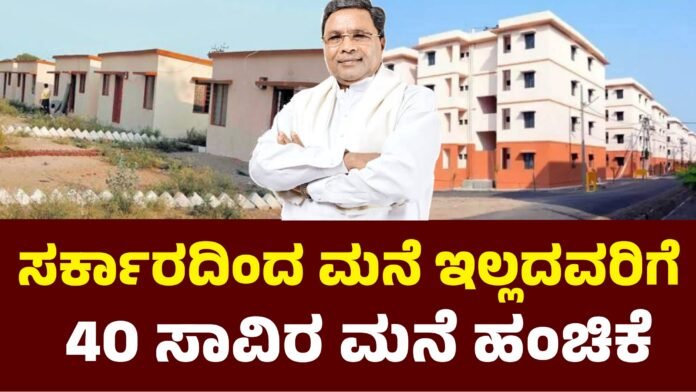Karnataka Prepares to Distribute 40,000 New Homes Under PM Awas Yojana
Housing has always been one of the most critical components of social and economic development. A safe, secure home is not just a roof over one’s head—it is the foundation of dignity, health, education, and stability. Recognizing this, both the central and state governments in India have consistently introduced housing schemes to support economically weaker families, marginalized groups, and socially disadvantaged communities.
In Karnataka, the Pradhan Mantri Awas Yojana (PMAY) and the Rajiv Gandhi Housing Corporation Limited (RGRHCL) are at the heart of housing development efforts. Recently, the state government announced a major milestone: the distribution of 40,345 new houses to families without their own homes. Alongside this, ongoing construction of over 1.8 lakh houses is expected to be completed by December 2026, signaling a huge leap forward in Karnataka’s “Housing for All” mission.
A Big Step Towards “Housing for All”
The Housing Minister of Karnataka, Mr. Zameer Ahmad Khan, confirmed that the state is moving at a steady pace to meet its housing targets. Out of the large number of projects sanctioned under PMAY, 36,789 houses have already been allotted to beneficiaries in the first phase. Now, preparations are in full swing for the second phase of distribution, which includes 40,345 additional houses across the state.
The government aims to ensure that no eligible family is left without shelter, particularly those belonging to Economically Weaker Sections (EWS), Low Income Groups (LIG), and Middle Income Groups (MIG), along with special categories such as Scheduled Castes (SCs), Scheduled Tribes (STs), Other Backward Classes (OBCs), senior citizens, widows, and differently-abled individuals.
Tackling Delays in Housing Projects
One of the major challenges in executing housing projects has been the issue of beneficiary contributions (share contribution). Under most schemes, families are required to contribute a portion of the construction cost, while the rest is provided as subsidy. Unfortunately, many families were unable to pay their share due to financial hardship, which resulted in project delays.
To overcome this bottleneck, the Karnataka government has taken a landmark decision: it will bear the beneficiary contribution itself for those unable to pay. This bold move not only reduces the financial stress on poor households but also speeds up the construction and delivery of homes.
Rajiv Gandhi Housing Corporation Projects
The issue of unpaid contributions was not limited to PMAY alone. Under the Rajiv Gandhi Housing Corporation Limited (RGRHCL), around 47,870 houses were facing similar delays. Acknowledging this, the government has extended the same financial relief here too—agreeing in principle to pay the pending share on behalf of the beneficiaries.
This proposal is expected to be presented in the upcoming cabinet meeting for final approval. Once cleared, it will unlock thousands of pending housing units and ensure that families can finally move into their new homes.
Financial Support and Subsidy Structure
The housing schemes in Karnataka are designed to provide maximum relief to low and middle-income families through subsidies, interest benefits, and flexible repayment terms. Some of the major financial features include:
- Urban Areas: Subsidies ranging from ₹1.5 lakh to ₹2.67 lakh per family.
- Rural Areas: Subsidies of ₹1.2 lakh to ₹1.3 lakh depending on the project.
- Interest Subsidy: Beneficiaries can avail of interest rate reductions between 3% and 6.5%, making loans affordable.
- Eligibility: Applicants must not already own a house anywhere in India. Priority is given to socially and economically vulnerable groups.
Broader Vision of the Government
The Karnataka government’s approach is not limited to just constructing houses. The larger vision is to build self-sustaining housing colonies that provide access to basic infrastructure like roads, electricity, drinking water, sanitation, schools, and healthcare facilities.
By accelerating these projects, the government aims to eliminate slum housing, improve the standard of living, and boost social equity. The initiative also provides employment opportunities in the construction sector, thereby supporting the local economy.
How to Apply for Housing Schemes
Eligible applicants can check details, eligibility criteria, and the step-by-step application process on the official PMAY website: https://pmaymis.gov.in.
Typically, the application requires:
- Aadhaar card
- Income certificate
- Caste certificate (if applicable)
- Residence proof
- Recent passport-size photographs
Once verified, beneficiaries are shortlisted, and homes are allotted either through direct construction projects or credit-linked subsidy programs.
Why This Initiative Matters
The announcement of 40,000 new houses is more than just a statistic—it represents security, hope, and opportunity for thousands of families. For a widow struggling to raise her children, for a differently-abled person seeking dignity, or for a slum-dwelling family dreaming of a pucca house, this initiative can transform lives.
Moreover, the state’s decision to absorb the financial contribution of poor beneficiaries sets a progressive precedent for welfare governance. Instead of allowing housing projects to stagnate, Karnataka has chosen to take proactive steps that prioritize people’s welfare over bureaucratic hurdles.
Looking Ahead
With nearly 2 lakh homes expected to be completed by 2026, Karnataka is well on track to become a model state in implementing housing welfare. If successful, this approach could serve as a blueprint for other states struggling with similar issues.
Housing is not just an economic issue; it is deeply tied to health, education, women’s empowerment, and social justice. A permanent home provides families with the stability to pursue better livelihoods, send children to school, and break out of cycles of poverty.
The PM Awas Yojana and RGRHCL projects in Karnataka are therefore not just construction schemes but vehicles of social transformation.
Apply Now
Conclusion
The distribution of 40,345 new homes under PMAY, coupled with the decision to support nearly 50,000 pending RGRHCL homes, represents a giant step forward in Karnataka’s housing mission. By addressing financial challenges faced by beneficiaries and ensuring timely completion of construction, the government is reinforcing its commitment to the dream of “Housing for All.”
This initiative will not only change skylines across Karnataka but also rewrite the life stories of countless families, giving them hope, security, and dignity.


